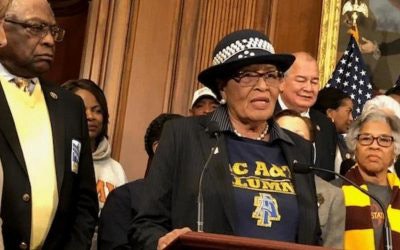With approximately a full year having passed since the onset of the COVID-19 pandemic in the U.S., The Hill hosted a virtual summit on Wednesday to explore the state of education.
The event, “The Future of Education,” was split into two sessions, with the first titled, “Equity, Investment, and the Tools We Need to Succeed.”
Panelists included North Carolina Rep. Alma Adams, Randi Weingarten, president of the American Federation of Teachers (AFT); Howard University President Dr. Wayne A . I. Frederick; Northern Virginia Community College (NVCC) President Dr. Anne Kress; Sarah Youssef, an NVCC sophomore and president of its Alexandria student government association; Amina Fazlullah, equity policy counsel for Common Sense Media; Dr. Dennis Cavitt, president-elect of the Council for Exceptional Children; and Maya Martin Cadogan, founder and executive director of PAVE.
 Rep. Alma Adams
Rep. Alma AdamsAdams noted that a digital divide exists. And even when equipment is provided to students, connectivity remains a key issue.
“Many of our young people, who come from communities that don’t have the connectivity that they need, they still have difficulty,” Adams said. “They’re going off to various places, McDonalds and other places, to connect up. And so, even having access to the equipment – say, the laptops that many of our schools are providing – if you’re not able to connect that somewhere, you still have a problem.”
She said that Congress has finally taken note of the situation and has included support for broadband in many of the pieces of legislation moving forward on Capitol Hill.
Still, the challenge, she added, is vaccinating teachers for a safe reopening of schools.
“They are essential workers as well,” she added,
The U.S. House of Representatives approved a $1.9 trillion COVID-19 relief plan earlier this week, which includes the provision of $125 billion to public K-12 schools to help students return to classes and for expenditures such as ventilation and personal protective equipment for teachers and support staff.
Weingarten said that trust is crucial for schools to reopen, and she called for more testing.
“The key is, to this roadmap, that for mitigation strategies for testing and for vaccine access to work, as the roadmap to reopening schools, you have to have trust,” she said. “And trust is earned by having people work together.”
The social isolation that was created as a result of the pandemic will also need to be addressed, she added.
“We need to really address the needs of the whole child,” Weingarten said. “Emotional and social needs are really important for children, for families, for all of our communities. And we’re not going to know when some of the issues of being anxious because of social isolation for the last year show up, so that’s why we need to wrap services around and really have those services intact, not just for kids but for families, including for our educator families.”
 Randi Weingarten
Randi WeingartenWeingarten added that the pandemic has demonstrated the importance of focusing on science and civics in schools.
“So why don’t we organize around powerful, meaningful instruction and project-based and team-based, so we get kids together, working together after this year of isolation?” she said. “So there’s a real opportunity here, but we can blow it really quickly if we don’t work together over the next few weeks and months to plan the next school year.”
As more Americans get vaccinated and schools start to reopen, Kress emphasized the value of virtual services.
“One of the things we’ve learned through the pandemic though is how valuable virtual services have been for our students,” Kress said, adding that “whether we’re talking about advising or financial aid counseling, setting up these virtual lobbies through Zoom and having students come in and have a one-stop shop to get their needs met. All of that has been incredibly valuable for our students and that’s definitely something that we will continue post-pandemic.”
Arrman Kyaw can be reached at [email protected]


















